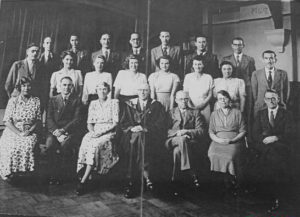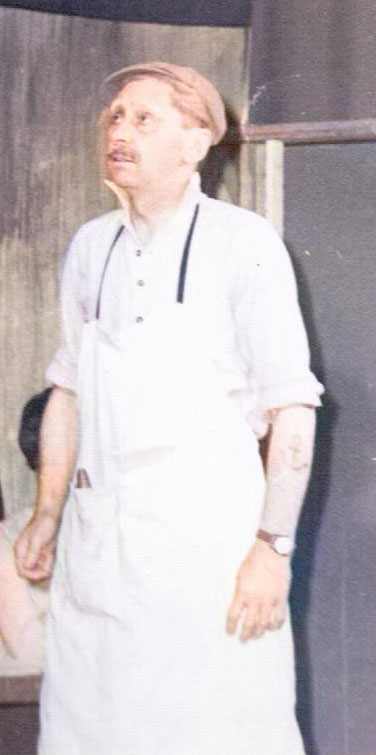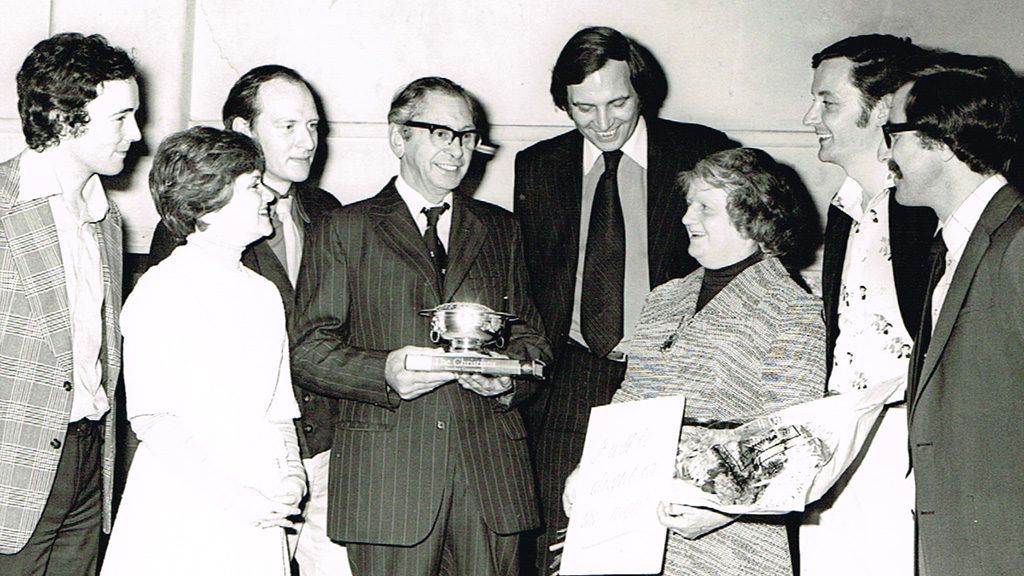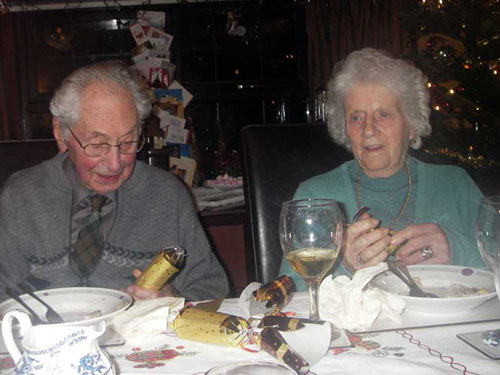Shortly after returning to teach at Markhouse in 1955, Cyril Malyon started a weekly After School Stagecraft Workshop – and thereby sowed the ‘seeds’ of all that was to follow!

Thereafter, in his role as its Artistic Director over the next twenty two years until his retirement in 1977, he oversaw and developed what became a vibrant, enjoyable and welcoming youth theatre group – the Markhouse Drama Club.
For all of us who had the privilege to have been part of that journey, ‘Mr Malyon’, as he was always fondly known and addressed, will always be remembered as a very kind and patient person who relished the opportunity to bring out the very best in young people; so helping them to realise their full potential. This is how he helped his own children, his pupils whilst teaching and similarly the many young people who were members of the Drama Club from its beginnings in 1955 to its eventual closure in 1977
Cyril’s early years – The Prologue!
Cyril was born to Nellie and Frank Malyon in 1914 and was brought up in their home in Walthamstow until he was aged 13; by which time he was a pupil at the Sir George Monoux School. Frank Malyon was a Book-keeper and Nellie, perhaps significantly to Cyril’s future, was a school teacher.
In January 1928 the family moved to North Wales where he attended the Friars School in Bangor – not far from Snowdon, the coast and the Isle of Anglesey – so a great contrast from the hustle and bustle of Walthamstow with its thriving High Street Market and ‘centrepiece’ of the Palace Theatre!
At a time when his peer group was no doubt assuming an ever greater significance in his life, the change of home location and school must have been difficult in many ways.
However, it equally proved to be a very significant one as, he recalled, that it was at his new school that I met an English teacher with a deep love of drama – which he described as the “modern stuff” and where “the seeds were sewn for the future” – so clearly re-enforcing the interest that he had already inherited from his father
It seems that one of this teacher’s main responsibilities was to produce the annual school play which was performed in a local theatre and, perhaps inevitably, Cyril duly got involved! His first performance was in “Ambrose Applejohn’s Adventure” – a play that he subsequently produced at Markhouse in 1961.
In his letter with his best wishes to all the former members present at the 2007 Re-Union, he also posed the question of whether anyone recalled ‘the second act pirate ship with all the gore’ – which, for some reason, clearly must have lodged firmly in his memory. Perhaps, if any reader of this part of the website still has a copy of the script, it would be good to have this description checked out for those of us whose recall is not a good as Cyril’s – some 46 years after he produced AAA!
However – the most important thing that he said he learnt from this teacher whilst at Friars School was that “there was far more to it (acting) than just going on stage – both from practical and educational viewpoints”.
“I shunned University or college as I hankered after the Army and that’s just where I headed and I thought I’d got away with further education – some hopes!!
Consequently, that was to be my future – not Drama – but I opted for a career in the Regular Army where I enrolled into the Royal Ordinance Corps and, in due course, found myself studying at the Military College of Science, taking a subject that no Grammar school would have provided – EXPLOSIVES – and subsequently onto bomb disposal – a job requiring much patience and a high level of concentration
The War, of course, intensified the need for this and finally in 1945, I found myself carrying out battlefield clearances – which meant finding things that should have gone bang and hadn’t gone bang and making them go bang without too much damage – Great Fun!
In the last few months of my career I was given a German Ammunition depot in a large forest to dispose of, so I left my mark in Germany in a pattern of craters around the countryside.
Eventually, the Army realised that they could get along without me and (in view of my injuries) decided that I had better become a civilian – and so, after serving in both France and Germany, I did – in 1947!
What to do next? – that was the question
I had spent so many years in a ‘destructive’ background, perhaps something constructive would be an improvement – and so up loomed the subject of teaching and in due time I passed through the Teachers Emergency Training College and, having been approved in the subjects of English (with Drama) and Light Crafts, I had retrained as a teacher.”
During his time in the Army Cyril met the young woman with whom he would spend some 72 years – her name was Hilda Brown and they married in Bangor in June 1936.
Hilda must have also had a very steady nerve – being married to a Bomb Disposal Officer – although, with his new career approaching, she must have looked forward a deal more optimistically to their future with his ‘marginally’ less stressful occupation of teaching young people – rather than instigating explosions – albeit from a safe distance!
After his teacher training Cyril returned to Walthamstow and embarked on his new career at Markhouse Road Secondary Modern School which, is thought, was no later than 1949 – as evidenced by the just about visible date in the top right hand corner of the school staff taken in that year. Sometime after this date Cyril had a brief move from Markhouse to Gamuel Road Primary School to alleviate their staff shortages.
It was at Gamuel that he first encountered a number of pupils who were, albeit unknown to them at that time, destined to become members of the Drama Club that he would eventually form. One of those pupils, Valerie Poore, recalls having been in the Gamuel School play that Cyril produced just before she was about to transfer to Markhouse and then, on arrival at her new school, she found that he was there as well – so it is clear that his return was in September 1956

Cyril’s (above) letter interestingly ‘sets the scene’ for what was about to follow.
“I entered Markhouse. It was all very stilted. Drama meant little more than reading Shakespeare in class – but a change was nigh and following the departure of the Headmaster (Mr Easton) and several other staff, things changed dramatically” (in 1957)
“Then along comes Mr. L.A. Smith” – the new Headmaster!
Shortly after his arrival, Les Smith and Cyril quickly found that they shared a positive view of how drama could be used as both an enjoyable and educational activity for the pupils in their charge – and so set forth to do something more about it!
“So it wasn’t long before I was given much freedom and the Upper Hall was converted into a reasonable theatre. It soon became a big thing with the annual productions. Props and scenery were made in the Craft Room and the school was disrupted with rehearsals”
What followed is, of course, ‘history’ – the vast numbers of young people involved, the large number and range of productions, the closure of the school and the consequent and timely ‘intervention’ of Marsh Street Youth Centre, the rebuilding the stage, drama festivals, excursions and the inevitably annual ‘ad lib’ strewn pantomimes – including a ‘peripatetic’ one at Trueloves School in Ingatestone via a Large Panel Van and a blizzard torn A12 – all of which will be recalled in greater detail elsewhere in this website.
All that had gone before – the influence of his father and the teacher in Bangor, being involved in drama societies, becoming a teacher, being at Markhouse at the ‘right’ time with the ‘right’ Head teacher and colleagues – had laid the groundwork for a wonderful period of fun, enjoyment and learning for so many young people – including those within his own family!
In writing about her father, shortly after his death, Jennifer recalls
“He loved teaching, but in his spare time he was also a member of a local Drama Group. His interest in drama was inherited from his own father and initiated from his school days in Bangor where this was keenly supported and encouraged.
As children we remember being taken to a vast variety of plays to watch him perform. These ranged from farce, to thrillers and Shakespeare; this was something we enjoyed very much. We were so excited by it all, the theatre atmosphere (whether it be indoor or in an outdoor amphitheatre), watching plays, understanding all the weeks of preparation and rehearsals and seeing what went on backstage. He gave us a real love and appreciation of the theatre, which still lives on in us today.

Although family members, we were never content to watch from the side-lines, so we also became members of the Markhouse Drama Club where, as one of the earliest members, I took a great interest in stage make-up and went on to do this for a number of local amateur groups. Alec enjoyed the acting and, my son Andrew, in later years, conveniently took on all the ‘juvenile’ parts that the rest of the members had become too old to play! stage area is also going to be enclosed to provide a dance/disco suite, although a portable stage will also be available to locate within the main hall when required
Drama was his life and gave him the opportunity to pursue his aims of developing the potential of those young people he served. He had his own way of discovering hidden talents and stimulating interest in activities which were so new to many.
Through acting, the young people benefited from his guidance and encouragement to go on stage and portray a variety of characters in the productions. This was always a great confidence booster for those concerned.
He also had a reputation for patiently helping those who had reading difficulties but who still wanted to participate in the plays. Initially he would read their lines to them until they were memorised and then confident enough to perform – firstly in front of their friends in rehearsals and then in public”
Act 1 – Markhouse Drama Club
Much happened at Markhouse in the following years and the Drama Club played its part in changing what, unfortunately, some local people described as the school’s less than ‘attractive or positive’ image – both in terms of how the children in its care were perceived and the apparent lack of achievement – with the latter, if true, perhaps not so surprising in the light of the comparatively poor level of resources, other than that of the interest and commitment of the staff, that it enjoyed – or rather – didn’t enjoy!
Cyril was clearly an adept team builder amongst the Markhouse staff as he managed, over the years, to pull many of his colleagues on board with his ambitions for drama; both within the official timetable and beyond it with the steady development of the Drama Club which, in the post school period, eventually operated most nights of the week
The Drama Club also showed its growing ability to retain many former pupils within its membership and many were eager to retain their links and, indeed, to contribute their time and energies back to their former school. This is perhaps amply shown in the Drama Club supplying the set of twins (Gordon & Gerald Aylott) that the school lacked at that time – for the parts of Tweedledum and Tweedledee in Alice in Wonderland!
All this was paralleled with Les Smith’s own team leadership, team building and growing ambitions for Markhouse which was no better marked than when, around 1959, it became one of the first secondary modern schools to offer the opportunity to undertake a 5th Year Course and thereby give access for its pupils to sit GCE exams.
Embedded in this was a belief that children mature and develop at different paces and that 11 years of age was not an age at which to determine how far they could go or, perhaps inadvertently, to negatively label them as not having the potential to be academic, clever, or skilful!
Along with his colleagues Reg Bowyer, Agnes Townsend, John Jones, Len Hart, Ron Pearce and Bill Pinches (and others), Cyril was part of a key group of staff that underpinned the whole of this important piece of ‘educational history’ and the opportunity it presented for the future of so many young people. He must have really enjoyed his role within this and, of course, his ‘icing on the cake’- in the form of the Drama Club.
As many readers of this ‘pen portrait’ will know, albeit probably not the reasons for it, a decision was taken by the Education Authority to close Markhouse Secondary Modern School in 1966. This was part of a re-structuring of secondary education into two distinct age groupings – with Markhouse not being seen as suitable for either!
However, the closure did not come before Cyril had worked his usual spell on several of the new, younger, staff who he had persuaded to be involved in the Drama Club – with a number – Norma Pepperell (Nee Evans) and Marjorie Kett, continuing throughout the post school period – and still involved through the Re-Union’s and Memorial Fund activities!
Although the Drama Club continued in these premises under his leadership for a further decade, his teaching career changed with a transfer, along with a number of other staff, to the nearby Beaconsfield Secondary School – formerly The Coppermill Lane Secondary Modern School.
This could not have been an easy or particularly welcomed experience for Cyril but, of course, the loss for those pupils at Markhouse, was a gain for those at Beaconsfield – although it now seems that his and Les Smith’s aspirations for the role of drama within the curriculum did not reach the same heights!
Many former Drama Club members who were similarly ‘transferred’ to other schools to finish their secondary education recount a shared story which, in short, might be just to say – ‘it was never quite the same’
Act 2 – The Curtain Closes
After teaching at Beaconsfield until 1977, Cyril took a deserved retirement although this also meant the closing of the curtains and doors at what, by that time, had become locally known as the Markhouse Theatre – and the Drama Club within it!
This was, of course, a sad but inevitable event, but equally one that was not allowed to go unmarked. Much to his surprise a covert ‘Farewell & Thank-you’ Celebration had been planned and, appropriately, this was held at Markhouse – where, fortunately for the ambiance of the event, the Stage had not yet been dismantled!
This event was attended by many current and former members. Many fantastic tributes were paid to Cyril at that time and, as his children subsequently confirmed, he and his wife Hilda so appreciated all the thanks and good wishes that this event marked.
Jennifer recounted that ‘over the years of the Club’s existence there had always been a wonderful atmosphere and sense of camaraderie – which was clearly shown on that particular evening. The Drama Club had been a great place for opening up doors of opportunity for the lives of the young people involved’.

Encore
Cyril and Hilda returned to Bangor shortly after ‘their’ retirement, but whilst a long distance away, they remained in contact with many of the Drama Club members, taking great interest in them and their families and their news.
Perhaps it is a sign of modern life that the more recent momentum for former members of the Drama Club to renew these friendships did not occur until 2007 – some 30 years after that Farewell Celebration in 1977 – with Cyril ‘attending’ this both in spirit and in writing – but, at 92 years of age, not in person!
Derek Steward, one of his former teaching colleagues at Markhouse read Cyril’s ‘prologue’ to the evening’s celebrations:
“We are great grandparents with a great granddaughter in college – and we have celebrated our 70th wedding anniversary, so we cannot claim to be spring chickens. Not too mobile either, Mrs. M is severely held back with arthritis and my old war injuries are quite a handicap.
Rambling around mountains is no longer on the cards, but we can sit in our front room and look at them. Twenty minutes’ drive and we are in them. We can sit by a lake at the foot of Snowdon and at this time of year the only sound is the wind, and being in Wales, the bleating of sheep. Yes, I am still driving.
Looking back – if you have the time and patience to spare – that is what I’d like to do. Where did all start?
Then, when Markhouse School was brought to an abrupt end in 1966, Marsh Street Youth Centre came to the rescue and took over. They gave us a free hand in the Upper Hall and supported us with finance, and I must say, we were a success.
We had winning ways too. Debate competitions with “Women-the superior sex”. One Act plays, such as “Passion, Poison and Petrifaction”
Drama in school to my mind teaches self-confidence, projection of ego and the worth of co-operation. I’m going to give myself a pat on the back now. I think I succeeded.
Remember – it was all a great success because of YOU. Everyone played their part whatever it might have been. On stage or off stage. You were a joy to work with, but by the time we closed down I wasn’t sure whether I was running a Drama Club or Marriage Bureau!
Have a great time. I’d always be pleased to hear from any of you – I hope I haven’t bored you too much and good luck for the future”.
Cyril

Obituary
Sadly, Cyril Malyon died on Wednesday 15th October 2008 aged 93 with his funeral, held at Bangor Crematorium, just a week later on the 22nd Oct 2008.
Richard (Dickie) Dunn wrote on his ‘walthamstowhistory’ website, that a number of former members of the Drama Club had attended the ceremony along with family and friends; also that he had the honour and privilege of playing the organ at the Service.
“I was asked to play something as the congregation was leaving, to remind everyone of Markhouse. I decided on “Listen to the Wind” which was a production at Markhouse in 1963. Everyone thought it appropriate”.
Hilda Malyon died in Bangor on Christmas Eve, 2011. She and Cyril had been happily married for 72 years.
“Our dad was always so fond and proud of all his members and of what they achieved; also how their experiences at the Drama Club had helped them in their lives and careers”
After Mrs Malyon died, Jennifer and Alec found a spider in the top of their parent’s wardrobe – a giant, but by then quite fragile, one – made by Mick Everett for the production of Little Miss Muffett in 1969!
This Pen Portrait has been compiled from the ‘memories’ of former Drama Club members, extracts of Alec and Jennifer Malyon’s emails and from Cyril Malyon’s letter to the 2007 Re-Union